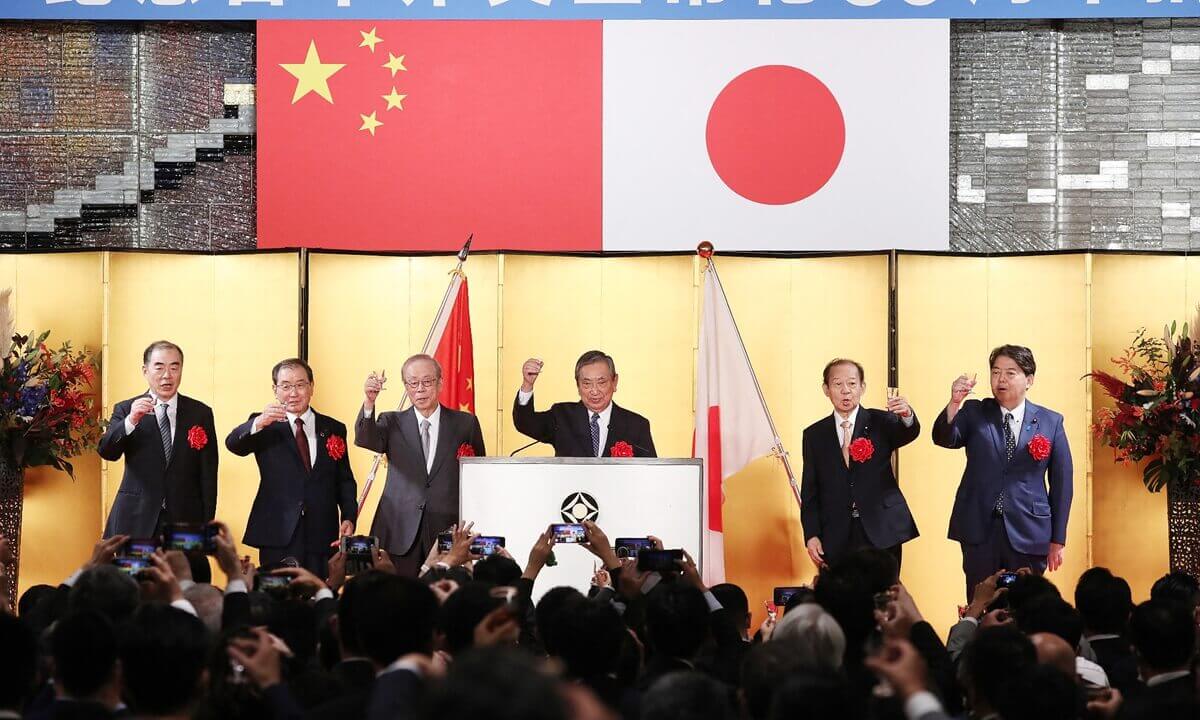On the occasion of the 50th anniversary of the normalisation of their diplomatic relations, China called on Japan to “properly manage” bilateral disputes and expressed hope to use the opportunity as “a new starting point.”
In a clearly worded congratulatory message to Japanese Prime Minister (PM) Fumio Kishida, Chinese Premier Li Keqiang said Beijing is willing to work with Tokyo “to maintain peaceful and friendly coexistence, safeguard the political foundation of bilateral relations, deepen exchanges and cooperation in various fields,” and “properly manage problems and disagreements.”
Similarly, in a phone call with Kishida, Chinese President Xi Jinping noted that over the past 50 years, both sides had jointly worked to achieve “a series of important common understandings” and “steadily deepened exchanges and cooperation in various fields” to the benefit of both countries.
#FMsays China and Japan should observe the four bilateral political documents and work for peace and friendliness, Foreign Ministry spokesman Wang Wenbin said on Thursday, marking the 50th anniversary of the normalization of bilateral diplomatic relations. pic.twitter.com/ij2pC2jGsQ
— Zhang Heqing张和清 (@zhang_heqing) September 29, 2022
In response, Kishida referred to former Chinese Premier Zhou Enlai and former Japanese PM Kakuei Tanaka, saying that “with strategic perspectives and political courage,” the two countries’ “elder generation of leaders” had “opened up a new historical journey” for bilateral relations 50 years ago. He also noted that they had made “remarkable progress [...] in a wide range of fields, including economy, culture and personnel exchanges.”
However, the celebration of the milestone anniversary between the two Asian powers has been lacklustre, with ties remaining severely strained.
Japan and China have a long-running dispute over the Senkaku Islands (which Beijing calls the Diaoyu) in the East China Sea. The islands have been administered by Tokyo since 1972 but China asserts that the islands are an “inherent part” of Chinese territory, saying that its claims to the isles date back hundreds of years. It has regularly deployed vessels to waters near the islands, which Japan has frequently protested.
Chinese President Xi Jinping & Japanese PM Fumio Kishida on Thur exchanged congratulatory messages over the 50th anniversary of the normalization of China-Japan diplomatic relations.
— Zhang Heqing张和清 (@zhang_heqing) September 29, 2022
The China-Japan relation is vital to promote peace & prosperity within the region & the world. pic.twitter.com/GNRB84L4zx
Kishida, a vocal critic of China, scaled up defence spending last year due to Beijing’s “unilateral attempts” to change the status quo in the East China Sea and across the Indo-Pacific at large. His government also lodged a protest with China in July after a naval vessel was found sailing in its contiguous waters.
In fact, in October, Japan’s ruling Liberal Democratic Party’s new manifesto included a long-term goal of spending 2% of the country’s annual GDP, which is usually about $100 billion or more, on military upkeep. The change was made in the face of rising aggression from China and North Korea in the region.
To mark the 50th anniversary of the normalization of China-Japan relations. President Xi Jinping and Premier Li Keqiang have exchanged congratulatory messages with Japanese Prime Minister Fumio Kishida. pic.twitter.com/jPYH1xmrhB
— Zhang Heqing张和清 (@zhang_heqing) September 29, 2022
Even the late Japanese PM Shinzo Abe urged China last December to not provoke regional disharmony or seek territorial expansion, warning that it would be “suicidal.”
Moreover, Japan has also been actively participating in signing military and economic partnership agreements in the Indo-Pacific to counter China’s dominance.
China has in turn accused Japan of “colluding” with the North Atlantic Treaty Organization (NATO), asserting that it is trying to hype the “China threat theory” as a way to foment regional tensions and “legitimise its ambition to develop military force and push for an amendment of its pacifist constitution.” To this end, it has echoed North Korea’s claims that the United States (US) is seeking to partner with both Japan and South Korea to create an ‘Asian NATO.’

